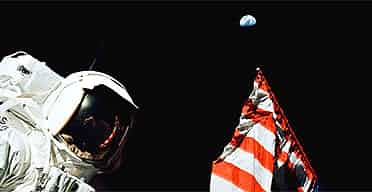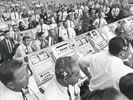Eye For Film >> Movies >> In The Shadow Of The Moon (2007) Film Review

There are only 12 people in the world who have stood on the surface of another planet. Even in the era of shuttles, space stations and ‘tourist’ astronauts that’s still a remarkable statistic, illustrating both how far we’ve come and how far we still have to go.
David Sington has used it as a launchpad for one of the best documentaries I’ve seen in a long time, charting the development of the Apollo moon landing programme in the simplest and most effective way possible – by allowing the astronauts to tell their own stories.

There’s a lot of impressive NASA footage (much of it previously unseen) but a large chunk of the film is just several elderly American men talking straight to camera. Sington has realised (unlike some other documentarians) that there’s nothing boring about listening to people if what they’re saying is interesting enough. And you simply don’t want them to stop.
It’s the first time surviving members of all the missions have been brought together, and possibly the last. At a time when funding for further space exploration is being questioned and the focus of the world’s scientific community is turning more on how we preserve our own planet, it’s a reminder of how exciting and optimistic that era felt, and how remarkable and heroic these men were.
It soon becomes clear they’d be the last people to describe themselves in those terms. To a man, they come across as humble, self-deprecating and at pains to stress the role of their colleagues and the NASA back-up team. But time and again, as they matter-of-factly describe sitting on top of a rocket as it takes off or piloting a lunar module onto the surface of another world for the first time, you find yourself thinking: that was bloody hard and bloody dangerous, and the men who did it certainly had (as the title of Tom Wolfe’s excellent book and Philip Kaufman’s superb film version puts it) “the right stuff”.
They’re certainly no establishment automatons, either. They appreciate that the programme, kick-started by President Kennedy’s speech to Congress in 1961, was a response to America’s lagging behind Russia in the space race. And that his pledge to put a man on the moon by the end of the decade was that of someone equal parts “genius, visionary and astute politician”.
Despite his assassination in the early stages of the programme, Kennedy’s spirit seems to hang over it; ambitious, idealistic, and occasionally over-eager to get results quick. The problems that led to the Apollo 1 training flight tragedy in 1967 aren’t skated around either. And a harrowing opening montage of test rockets exploding spectacularly reminds the audience how high the stakes were.
The astronauts are unflinchingly honest with themselves too. One man admits his guilt at missing Vietnam because “I felt it was my war”, another is always conscious that “death was always just an inch away”.
But the contagious sense of excitement, discovery and sheer fun in attempting the unknown is vividly conveyed too. To watch the astronauts gleefully testing their lunar equipment like kids at Christmas or drawing plans for ‘their’ section of the spacecraft on huge sheets of graph paper is a reminder that these guys were both ‘best of the rest’ aviators and top-drawer scientists, working in an era when the computer power available to them was probably less than that of the average three year old mobile phone.
It’s a computer overload problem that prompts the film’s most dramatic moment, when the Apollo 11 lunar module goes off course and Neil Armstrong has to land it manually. That historic moment was the result of ‘seat of the pants’ flying by a man who even his fellow astronauts acknowledge was “just about the coolest under pressure of any of us”.
The lack of an interview with the famously reclusive Armstrong (though he backed and advised the project) does leave a bit of a gaping hole, but his colleagues go a long way to plugging it. Each comes across as a very different individual (Buzz Aldrin, the second moonwalker is described as “a very scientific guy... not the kind you’d want to get stuck with at a party” and doesn’t bother to deny it). If there is a star, though, it has to be Mike Collins, pilot of the Apollo 11 command module. Lean and sparky, with a dry, sly wit, he could be the whacky janitor in a Coen Brothers movie, instead of one of the few men who truly have “slipped the surly bonds of earth”.
Whatever your thoughts on the merits of the space race - in its past and present forms - it’s impossible not to share their sense of wonder and privilege at their unique experience. And stick around for the end credits sequence, where they each tackle the “was it all a fake?” question. If it was, all I can say is that these guys are the finest actors who ever lived.
Reviewed on: 15 Sep 2007

















